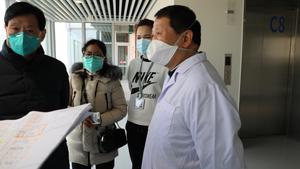Editor’s note: Among the thousands of people who went to Wuhan to join the battle against the novel coronavirus is Hong Kong businessman Tse Chun-ming, the founder and chairman of a Hong Kong-funded Wuhan Asia General Hospital which has taken in some 430 infected patients. Tse shares with He Shusi his experience on the front line, and explains why he left for Wuhan when he could have stayed with his family in Hong Kong.
 Tse Chun-ming (first right), the founder and chairman of Wuhan Asia General Hospital (PROVIDED TO CHINA DAILY)
Tse Chun-ming (first right), the founder and chairman of Wuhan Asia General Hospital (PROVIDED TO CHINA DAILY)
Q: You chose to go to Wuhan after learning about the virus outbreak while many people were fleeing the city. What motivated you to make that choice?
A: I am the head of the hospital. I came to Wuhan one day before Chinese New Year’s Eve. At that time, most of our doctors and nurses were about to go to their hometowns for the holiday. Then the epidemic broke out, and they couldn’t leave. I believed that my presence would help boost their confidence. More important was that I must be here to manage and appropriate resources. If I hadn’t come back, the deployment of resources would not be as quick and that could affect our work. At the beginning of the epidemic, we already had 30 to 40 medical workers infected because they were not familiar with the precautionary procedures.
Q: What’s your daily life like? How long do you work every day?
A: More than 10 hours a day, every day.
Q: In the hospital?
A: Yes. There are some 430 severe cases of novel coronavirus patients in the hospital. And we have been given responsibility of about 1,000 beds in the field module hospitals in Wuhan.
My top priority is to protect our medical workers from infection. So I need to deploy and ensure we have enough protective gear and N95 masks, which are in short supply in Wuhan despite the government’s efforts. It is up to me to make the best use of what we have to protect our medical staff.
Also, I need to guarantee the supply of medication to make sure our patients will receive proper treatment. I need to find enough food to feed almost 2,000 people in the hospital, and arrange the accommodation and transportation of our medical workers, as well as liaise with other governmental and medical facilities. So my most important role here is to be a dispatcher and housekeeper.
Q: Are all medical workers temporarily staying near the hospital?
A: Yes. They are living in hotels near the hospital and can’t go home because they could pose a risk of infecting their family members. So they can only stay in hotels.
Q: How’s the morale of front-line medical workers? Does the hospital offer any special council for them?
A: Each medical worker will undergo two-week quarantine and rest after working for two weeks. At any time, we have 500 to 600 people on duty while the other 600 take a rest. I ensure they receive proper training about how to protect themselves, how to face patients, and how to treat them. We have to teach them many skills. But to protect themselves is the most crucial.
Meanwhile, we will guarantee they eat nutritious meals with high protein and drink lots of water, and have enough rest. In addition, wearing protective suits for a long time, like two to three hours, can cause dizziness and other problems. So we need to help them build physical strength.
Q: How long do they work every day?
A: About eight to nine hours.
Q: Prior to the epidemic, have you dealt with any similar situations?
A: I experienced SARS (in 2003).
Q: So you have accumulated some experience during SARS?
A: I would say a little. What’s different this time is that it came too quickly before people could react. For SARS, people had some mental preparation. But this time, we have no such preparation. As a result, when it first hit, all was in disarray, from the government to the hospitals, from the management to the front line. Now everything is gradually being sorted out.
Q: As the leader of a Hong Kong-funded hospital in Wuhan, do you have any special feeling about the epidemic?
A: My feeling is that, to some degree, everyone had responded too slowly to the disease. From the government to medical institutions and ordinary people, everyone was ill-prepared mentally for this. Only when Wuhan was locked down on Jan 23 (one day before the Lunar New Year Eve), did people realize the severity of the matter, and started to be vigilant. I think if people could have taken precautionary measures earlier, the situation might not be as bad.
A few days ago, Vice-Premier Sun Chunlan visited the hospital, and highly recognized our work. Ours is a 100 percent Hong Kong-funded hospital. During the epidemic, the hospital symbolizes the bond between people in Hong Kong and those on the mainland. The vice-premier highly affirmed our role.


